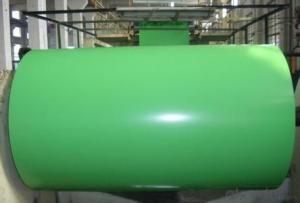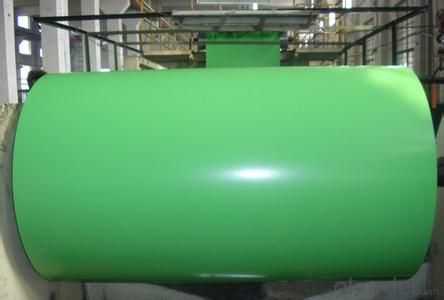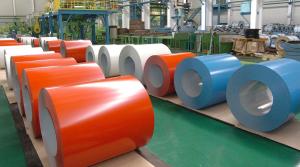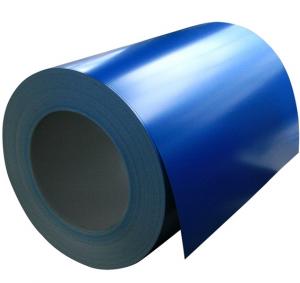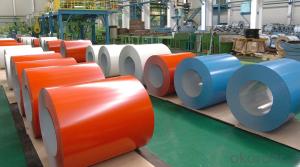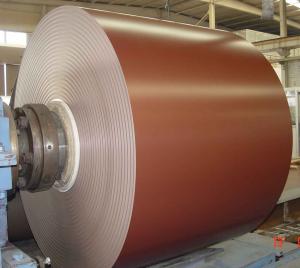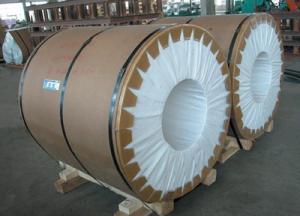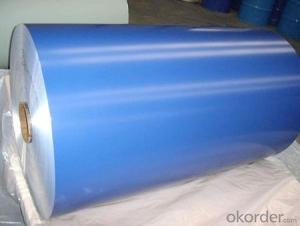Coil Aluminum Prepainted Aluminum Coils 5xxx
- Loading Port:
- China Main Port
- Payment Terms:
- TT OR LC
- Min Order Qty:
- -
- Supply Capability:
- -
OKorder Service Pledge
OKorder Financial Service
You Might Also Like
Specifications
1.Thickness:0.2-4mm
2.Width:800-1900mm
3.excellent quality and reasonable price
4.fast delivery time
color coated aluminum coil
1.Thickness:0.2-4mm
2.Width:800-1900mm
3.excellent quality and reasonable price
4.fast delivery time
Color coated aluminum sheet/coil
| |
Alloy grade | 1050,1060,1100,3003,3004,3005,3105,5005,5052 ,5754 etc |
Hardness | 0,H12,H14,H16,H18,H22,H24,H26,H32,H34,H111, |
Thickness | 0.2-4mm |
width | 800-1900mm |
Popular size | 1000*2000,1200*2400,1219*2438,1220*2440 |
Color | white, gray ,gold ,blue, red, etc |
Coating | Polyester, Fluorocarbon, polyurethane and epoxy coating |
Application/use | Outdoor decoration, business chain, exhibition of advertisement decoration and display ,ACP, wall cladding, facades, roofs and canopies, ceilings, signboards, blind window, display platforms, electrical panels etc |
MOQ | 3-5 tons, negotiable |
Payment terms | T/T or L/C |
Delivery | About 15 days after receipt of deposit |
Package | Export standard package |
Kindly remind | Our machine can cut any size according to your requirement |
- Q: Can aluminum material be utilized as a baking surface for bread?
- <p>Aluminum coils are not typically used for baking bread. While aluminum is a good conductor of heat and is used in baking sheets and muffin tins, it's usually in a flat, solid form. Aluminum coils, often used for industrial purposes like heat exchangers, are not designed for direct food contact. For baking bread, it's best to use materials specifically designed for baking, such as silicone mats, parchment paper, or non-stick baking sheets. These materials are safe for food contact and can withstand the high temperatures required for baking bread.</p>
- Q: Can aluminum coils be used in the production of kitchen utensils?
- Yes, aluminum coils can be used in the production of kitchen utensils. Aluminum is a popular choice for kitchen utensils due to its excellent heat conductivity, lightweight nature, and corrosion resistance. It can be easily formed into various shapes, making it suitable for manufacturing utensils like pots, pans, and baking sheets.
- Q: This question asks for a comparison between cold rolling and hot rolling processes, specifically in the context of steel wire production for coilings.
- <p>Cold rolling and hot rolling are two distinct processes used in the manufacturing of steel wires for coilings. Hot rolling is performed at high temperatures, typically above the recrystallization temperature of the steel, which allows the material to be shaped more easily. This process results in a more ductile and less hard steel, which can be beneficial for certain applications. However, hot-rolled steel may have a rougher surface and may require further processing to achieve desired dimensions and surface finish. Cold rolling, on the other hand, is done at room temperature, which imparts a harder and smoother surface to the steel. It is more precise and results in tighter tolerances, making it suitable for applications requiring high strength and precision. Cold-rolled steel also has better surface finish and dimensional accuracy compared to hot-rolled steel. However, cold rolling is more energy-intensive and may not be suitable for very thick materials due to the increased hardness of the steel at room temperature.</p>
- Q: I have my brother's old wooden crutches but i see everyone using aluminum and i have the option to get aluminum ones. Is there any reason why they'd be better then my wooden ones?
- crutches are crutches!
- Q: Is it possible to determine the spring constant of an aluminum coil using a spring compressor?
- <p>Yes, you can use a spring compressor to measure the spring constant of an aluminum coil. The spring constant (k) can be calculated using Hooke's Law, which states that the force exerted by a spring is proportional to its displacement (F = kx). By applying a known force to the spring and measuring the resulting displacement, you can calculate the spring constant. A spring compressor can apply a controlled force, and a displacement gauge can measure the compression, allowing you to determine the spring constant accurately.</p>
- Q: How are aluminum coils used in the manufacturing of cookware?
- Due to their exceptional heat conductivity and lightweight nature, aluminum coils find extensive use in the production of cookware. Cookware manufacturers typically rely on aluminum coils as the primary material for constructing the bases and bodies of pots, pans, and other cooking utensils. To begin with, the process involves rolling out the aluminum coils and subsequently cutting them into various shapes and sizes to match the desired cookware product. Preferred over alternative materials such as stainless steel or cast iron, these coils excel in heat conduction, ensuring even distribution of heat across the cookware's surface for thorough and uniform cooking. Furthermore, the lightweight nature of aluminum coils enhances the manageability and maneuverability of the resulting cookware. This is particularly advantageous for professional chefs and home cooks, who frequently need to lift and move pots and pans while cooking. Moreover, due to the malleability of aluminum, it can be easily shaped and molded into diverse designs and styles for different cookware types like saucepans, frying pans, or baking trays. This versatility in cookware manufacturing allows for customization according to specific needs. Additionally, aluminum exhibits natural resistance to corrosion, making it a durable option for cookware. It remains unaffected by acidic or alkaline ingredients commonly used in cooking, ensuring the cookware's safety for food preparation and cooking. Lastly, aluminum coils can undergo treatments with non-stick coatings like Teflon, introducing the benefits of non-stick cookware. These coatings provide added convenience by facilitating easy food release and hassle-free cleaning. In conclusion, the utilization of aluminum coils in cookware manufacturing is essential due to their exceptional heat conductivity, lightweight construction, versatility in design, durability, and the option for non-stick coatings. These qualities make aluminum coils the ideal choice for producing high-quality cookware that delivers superior cooking performance and convenience in the kitchen.
- Q: How do aluminum coils contribute to sustainable manufacturing?
- Aluminum coils contribute significantly to sustainable manufacturing in various ways. Firstly, aluminum is a highly recyclable material, and the use of aluminum coils promotes a closed-loop recycling system. These coils can be easily melted down and reused without losing their original properties, reducing the need for new raw materials and minimizing the environmental impact of mining and extraction. Additionally, aluminum coils are lightweight, which reduces energy consumption during transportation. Their lightweight nature makes them more fuel-efficient to transport, resulting in lower greenhouse gas emissions. This not only reduces the carbon footprint but also saves costs associated with transportation. Moreover, aluminum has excellent corrosion resistance properties, which makes it durable and long-lasting. This durability reduces the need for frequent replacements, leading to less waste generation. It also extends the lifespan of products that use aluminum coils, reducing overall resource consumption and minimizing environmental strain. Furthermore, the use of aluminum coils in manufacturing processes promotes energy efficiency. Aluminum has high thermal conductivity, meaning it can efficiently transfer and dissipate heat, resulting in reduced energy consumption during various manufacturing operations. This energy efficiency translates into lower energy costs and reduced greenhouse gas emissions. Lastly, aluminum is non-toxic and does not release harmful substances during its lifecycle. This ensures the safety of workers, consumers, and the environment. The absence of toxic materials also simplifies the recycling process, making it easier and more environmentally friendly. In conclusion, aluminum coils contribute to sustainable manufacturing through their recyclability, lightweight nature, durability, energy efficiency, and non-toxic properties. By incorporating aluminum coils into manufacturing processes, companies can reduce their environmental impact, conserve resources, and promote a more sustainable future.
- Q: What are the different coil winding options for aluminum coils?
- There are several coil winding options for aluminum coils, including random winding, layer winding, and helical winding. Random winding involves winding the aluminum wire in a haphazard manner, while layer winding involves winding the wire in a neat, concentric manner. Helical winding, on the other hand, involves winding the wire in a spiral or helix pattern. Each winding option has its own advantages and is chosen based on specific requirements and applications.
- Q: How are aluminum coils used in signage and advertising?
- Signage and advertising frequently utilize aluminum coils due to their versatility, durability, and cost-effectiveness. These coils are commonly employed in the creation of sign panels, which can be found in various locations such as billboards, retail stores, airports, and public spaces. One of the primary benefits of using aluminum coils in signage is their lightweight nature. This facilitates easier installation and transportation, making it the preferred choice for large-scale outdoor advertisements like billboards. Moreover, aluminum coils can be easily shaped and molded into various forms, enabling the creation of creative and attention-grabbing designs. Thanks to their durability, aluminum coils exhibit high resistance to weather conditions, including harsh sunlight, rain, and snow. This makes them exceptionally suitable for outdoor signage that needs to withstand the elements. The material's resistance to corrosion also ensures that the signage maintains its appearance over time, extending its lifespan and reducing maintenance costs. Additionally, aluminum coils can be coated or painted with different finishes, allowing for customization and branding. These finishes can range from vibrant colors to reflective or brushed effects, enhancing the visual impact of the signage. The smooth surface of aluminum coils also provides an excellent base for printing graphics and logos, resulting in high-quality and vibrant imagery. In terms of cost-effectiveness, aluminum coils are relatively affordable in comparison to other materials commonly used in signage, such as steel or plastic. The lightweight nature of aluminum also reduces shipping costs and simplifies installation, saving time and money for businesses or advertisers. Overall, aluminum coils play a critical role in the signage and advertising industry by providing a versatile, durable, and cost-effective solution for creating visually appealing and long-lasting signs. Their lightweight nature, resistance to weather conditions, customizable finishes, and affordability make them a popular choice for a wide range of signage applications.
- Q: How do aluminum coils compare to copper coils in terms of performance?
- Aluminum coils and copper coils are two common types of heat exchanger coils used in heating, ventilation, and air conditioning (HVAC) systems. While both materials are effective in transferring heat, they do differ in terms of performance. Copper coils have long been the preferred choice for HVAC systems due to their superior heat transfer properties. Copper is an excellent conductor of heat, allowing for efficient transfer of thermal energy. This means that copper coils can cool or heat the surrounding air more effectively, resulting in faster and more efficient temperature control. On the other hand, aluminum coils are less efficient in terms of heat transfer compared to copper coils. Aluminum is a poorer conductor of heat, which means that it requires a larger surface area to achieve the same level of heat transfer as copper. Consequently, aluminum coils tend to be larger in size to compensate for their lower heat transfer capabilities. However, aluminum coils do have some advantages over copper coils. Firstly, aluminum is a lightweight material, making it easier to handle and install. This can be particularly beneficial in situations where weight restrictions or handling limitations are a concern. Secondly, aluminum coils are more resistant to corrosion compared to copper coils. Copper is prone to corrosion over time, especially in environments with high humidity or exposure to certain chemicals. Aluminum, on the other hand, naturally forms a protective oxide layer that helps prevent corrosion. This can result in longer-lasting coils and a lower likelihood of refrigerant leaks. In summary, while copper coils offer superior heat transfer capabilities, aluminum coils have their own advantages such as lighter weight and better corrosion resistance. The choice between aluminum and copper coils ultimately depends on the specific requirements of the HVAC system, including the desired performance, budget, and environmental factors.
Send your message to us
Coil Aluminum Prepainted Aluminum Coils 5xxx
- Loading Port:
- China Main Port
- Payment Terms:
- TT OR LC
- Min Order Qty:
- -
- Supply Capability:
- -
OKorder Service Pledge
OKorder Financial Service
Similar products
Hot products
Hot Searches
Related keywords
